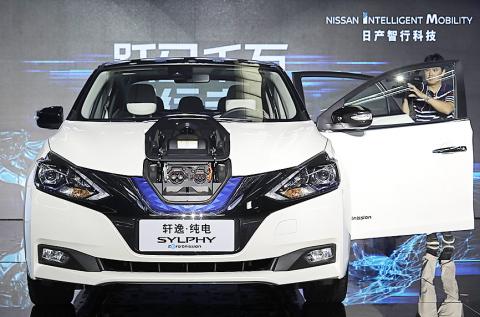Nissan Motor Co’s first electric sedan designed for China yesterday began production at the start of a wave of dozens of planned lower-cost electric vehicles (EVs) being produced by global automakers for their biggest market.
Manufacturers, including General Motors Co (GM) and Volkswagen AG, are this year to launch a flood of electric sedans, minivans and sports utility vehicles in China designed for local tastes and smaller budgets.
Nissan, Tesla Motors Inc, GM and others sell imported electric cars or electrified versions of models made by Chinese partners, but the market is dominated by low-cost local rivals including BYD Co (比亞迪).

Photo: AP
The Chinese government sees electric cars as a promising industry and a way to clean up its smog-choked cities.
It has spent heavily on subsidies to Chinese producers, and is shifting the burden to automakers with sales quotas and tougher fuel efficiency standards.
The Sylphy Zero Emission, based on Nissan’s Leaf, is being produced by Nissan and a Chinese partner, Dongfeng Group (東風集團).
The Sylphy costs 166,000 yuan (US$25,850) after government subsidies, or just more than half the sticker price of the Chinese version of the Leaf sold by Nissan and Dongfeng’s joint venture Venucia brand.
The Sylphy can go 338km on a charge, Nissan has said.
“We’re confident that the Sylphy Zero Emission rolling off the production line today will become a main player in the EV market,” Nissan chief executive officer Hiroto Saikawa said yesterday.
“We’re going to roll out a range of EVs that will appeal to customers within all market segments,” he said.
Sales quotas that are to take effect next year require every brand to sell electric vehicles or buy credits from competitors that do.
That puts pressure on automakers to design models that Chinese want and can afford.
China last year accounted for half of global electric car sales, but almost all of those came from Chinese brands including BYD Auto and BAIC Group (北汽集團).
Their prices start as low as 140,000 yuan.
“Basically, all these international giants are testing the water. They have not really launched their heavyweight models in China yet,” said industry analyst Yale Zhang (張豫) of Automotive Foresight.
“By the end of this year, things will be different,” Zhang said. “We really will see the market become more competitive and consumers will have more to choose.”
Chinese government plans call for total annual sales of 2 million electric and gasoline-electric hybrid vehicles by 2020, up from last year’s 770,000.
GM has said it will roll out 10 electric and hybrid models in China from 2016 to 2020.
By 2025, all its Buick, Cadillac and Chevrolet models in China would offer hybrid or fully electric versions, it said.
Tesla has said that China is its second-largest market.
However, a high sticker price has limited sales by other foreign brands to a few hundred vehicles.

Macronix International Co (旺宏), the world’s biggest NOR flash memory supplier, yesterday said it would spend NT$22 billion (US$699.1 million) on capacity expansion this year to increase its production of mid-to-low-density memory chips as the world’s major memorychip suppliers are phasing out the market. The company said its planned capital expenditures are about 11 times higher than the NT$1.8 billion it spent on new facilities and equipment last year. A majority of this year’s outlay would be allocated to step up capacity of multi-level cell (MLC) NAND flash memory chips, which are used in embedded multimedia cards (eMMC), a managed

CULPRITS: Factors that affected the slip included falling global crude oil prices, wait-and-see consumer attitudes due to US tariffs and a different Lunar New Year holiday schedule Taiwan’s retail sales ended a nine-year growth streak last year, slipping 0.2 percent from a year earlier as uncertainty over US tariff policies affected demand for durable goods, data released on Friday by the Ministry of Economic Affairs showed. Last year’s retail sales totaled NT$4.84 trillion (US$153.27 billion), down about NT$9.5 billion, or 0.2 percent, from 2024. Despite the decline, the figure was still the second-highest annual sales total on record. Ministry statistics department deputy head Chen Yu-fang (陳玉芳) said sales of cars, motorcycles and related products, which accounted for 17.4 percent of total retail rales last year, fell NT$68.1 billion, or

In the wake of strong global demand for AI applications, Taiwan’s export-oriented economy accelerated with the composite index of economic indicators flashing the first “red” light in December for one year, indicating the economy is in booming mode, the National Development Council (NDC) said yesterday. Moreover, the index of leading indicators, which gauges the potential state of the economy over the next six months, also moved higher in December amid growing optimism over the outlook, the NDC said. In December, the index of economic indicators rose one point from a month earlier to 38, at the lower end of the “red” light.

MediaTek Inc (聯發科) shares yesterday notched their best two-day rally on record, as investors flock to the Taiwanese chip designer on excitement over its tie-up with Google. The Taipei-listed stock jumped 8.59 percent, capping a two-session surge of 19 percent and closing at a fresh all-time high of NT$1,770. That extended a two-month rally on growing awareness of MediaTek’s work on Google’s tensor processing units (TPUs), which are chips used in artificial intelligence (AI) applications. It also highlights how fund managers faced with single-stock limits on their holding of market titan Taiwan Semiconductor Manufacturing Co (TSMC, 台積電) are diversifying into other AI-related firms.